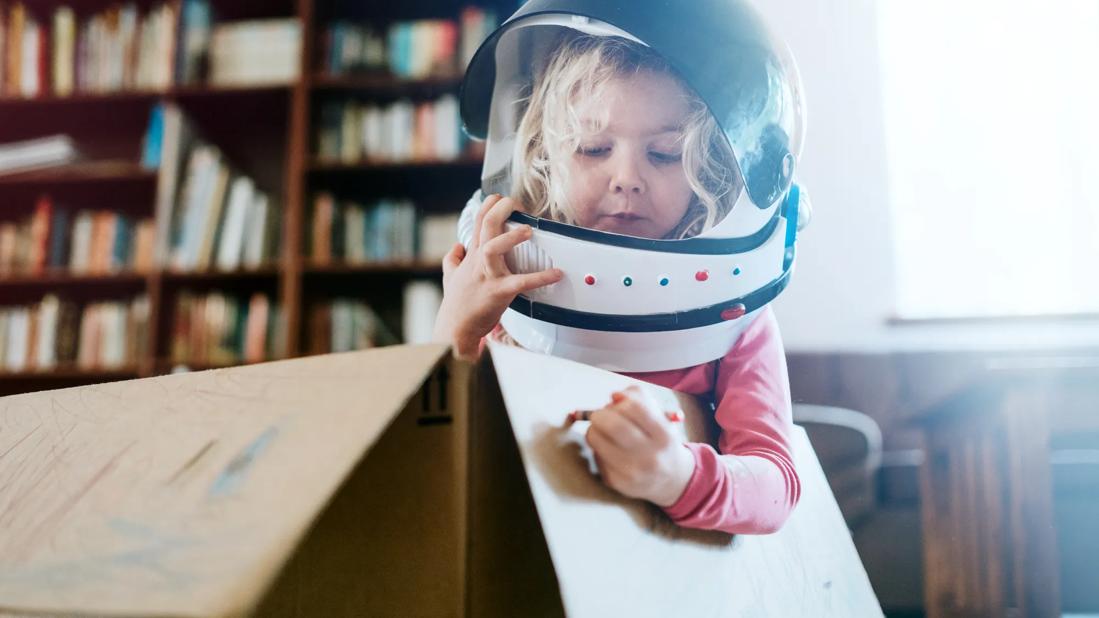Creating a pal in their mind can help children learn social skills, overcome fears and build creativity

Image content: This image is available to view online.
View image online (https://assets.clevelandclinic.org/transform/437aff16-fa5e-492b-986a-b207a09aa272/kid-play-time-outer-space-875850924)
Young child at home, with space helmet on, sitting in cardboard box, coloring on the box
Learning how to make friends is part of childhood — and for some kids, it involves a bit of imagination.
Advertisement
Cleveland Clinic is a non-profit academic medical center. Advertising on our site helps support our mission. We do not endorse non-Cleveland Clinic products or services. Policy
According to some estimates, nearly 2 out of 3 children hang out with an imaginary friend while growing up. It’s not unheard of for some kids to even carry on that relationship approaching their teen years.
It’s all perfectly normal … but that doesn’t mean you don’t have questions about this unseen household member. So, let’s learn a little more about imaginary friends from pediatric psychologist Kate Eshleman, PsyD.
Video content: This video is available to watch online.
View video online (https://cdnapisec.kaltura.com/p/2207941/sp/220794100/playManifest/entryId/1_8m7cxesp/flavorId/1_5f3sgelj/format/url/protocol/https/a.mp4)
As kids learn how to use their imagination, it’s not unusual for them to apply that developing mental process to generate a buddy. “It’s a way for them to express newfound creativity,” says Dr. Eshleman.
This imaginary friend (IF) can become your child’s co-pilot as they go about learning social skills and exploring concepts and ideas. (It’s why a kid might set a table to share a meal and conversation with their IF.)
“Imaginary friends allow children to practice different scenarios — and they get to try things out through a lens of their own creation in a situation they can control,” she explains.
It should be emphasized, too, that it’s OK for a child not to have an IF. Constructing a make-believe character isn’t a critical developmental step. “Every kid is different,” she reassures. “Some have imaginary friends and some don’t. It’s that simple.”
Advertisement
Imaginary friends come in many forms. The pal may be a person or animal that’s invisible to the world. It might be a doll, toy or stuffed animal (like Hobbes from the “Calvin and Hobbes” comic strip).
The friend could even be a balloon, rock or other random item that your child somehow adopts.
“Imaginary friends can take any shape,” says Dr. Eshleman. “That’s the beauty of imagination.”
IFs might not be real, but they can deliver real benefits for your child. The list of perks includes:
Parents worry about a lot of things, but the presence of an imaginary friend usually shouldn’t be high on the list. (More on that in a moment.)
“An imaginary friend is more likely to demonstrate positive attributes of a child — creativity and resilience, for example — than anything that parents should be concerned about,” says Dr. Eshleman.
It might be time to take a closer look at your child’s relationship with an imaginary friend if your child:
“These aren’t things that are automatically problematic, but they deserve a closer look,” states Dr. Eshleman. “Talk to your pediatrician about any concerns. It never hurts to ask questions.”
If your child has an imaginary friend, try to be accepting and curious about the relationship.
“It’s a great opportunity to engage your child and get them to talk,” says Dr. Eshleman. “Ask questions about the imaginary friend as if they were real. Talk to them about what they did with their friend today.”
Advertisement
Treat it the same as if you entered the world of make-believe that often comes with playing with dolls or cars. “Embrace it as a positive thing,” she encourages.
Advertisement

Sign up for our Health Essentials emails for expert guidance on nutrition, fitness, sleep, skin care and more.
Learn more about our editorial process.
Advertisement
Most kids start losing baby teeth around age 6 — but there’s some wiggle room in the timeline
From playful movement to strength-building, kids need exercise to stay healthy and strong
Combat summer learning loss and keep young brains engaged with low-pressure learning
Heap on the praise for a job well done and stay consistent
Have their eyes evaluated shortly after birth, before their first birthday, and at ages 3, 5 and beyond
Routine screenings at school are normal and important
Teaching kids how to share at the appropriate age can help them develop social skills and manage their emotions
By disrupting a child’s ability to think and act for themselves, snowplow parents run the risk of delaying their child’s ability to learn
Prioritize your health by managing stress, strengthening your social connections and getting quality sleep
Bolsters, blankets, pillows and blocks can offer extra support, stability and comfort
Allergies, postnasal drip, asthma or reflux could be to blame for a cough that won’t quit